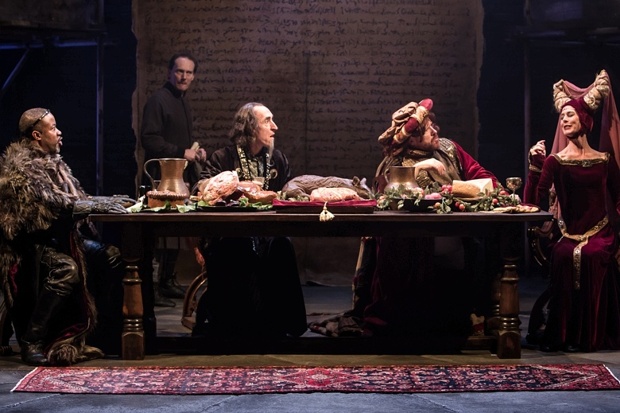The Magna Carta Plays at Salisbury Playhouse
reviewed for The Times, 26 October 2015

Trevor Michael Georges, Michael Mears, Tim Frances and Juliet Howland in Kingmakers, Anders Lustgarten’s play. Image Credit: Richard Davenport
![]()
Thank goodness for an anniversary commission which realises that Magna Carta isn’t all it’s cracked up to be. Sadly, that’s all to be thankful for in this series of Corbynite skits on modern robber barons (Russian oligarchs and British bankers). Salisbury Cathedral houses the cleanest 1215 copy of the charter, so Salisbury Playhouse has commissioned four playwrights to produce mini-plays on the theme. However, there’s little historical perspective in this act of remembrance, just unfocused anger.
Magna Carta primarily offered an opportunity for King John’s barons to consolidate their own feudal rights. So Anders Lustgarten starts us off with Kingmakers, the one playlet set in period (1225, when Henry III reissued his father’s charter). It’s a verse comedy with shades ofHorrible Histories. “ Democracy is all Greek to me,” quips one Norman lord. Groan. There are good cod-Shakespearean jokes for republicans: Henry is smart enough to cut a deal with the barons, “though like all kings I am derived / from shallow gene pool”, but though Ben Scott has charisma as the young king, this never rises above student skit. Lustgarten has long proved himself an exciting, challenging poet-playwright, but in the rush to make cheap contemporary analogies his talent for subtle characters is lost.
Running counter to such cynicism is that old English dream of Magna Carta as a rebellious burst of Anglo-Saxon agrarianism, still bubbling under the Norman colonial yoke. Levellers and Diggers claimed this tradition: now Sally Woodcock’s Pink Gin transports it to a Mugabe-esque African republic (King John as modern dictator, selling off the common resources — though he learnt the trick from the English). But it’s noisy, tangled and clichéd.
Meanwhile, Howard Brenton gives us Ransomed, an oddly English homage to The Killing. In Melchester (Salisbury), a Russian oligarch attempts to hold an original Magna Carta to ransom in return for a British passport. Joanna Van Kampen is good as our Sarah Lund (down to the Scandinavian jumper), a disgraced spook banished to small-town policing, but this script is crashingly earnest: “We need a new Magna Carta . . . trouble is, who’s going to write it?” “Perhaps it’s written in our hearts.” A Blue Peter project, perhaps?
After all this, Timberlake Wertenbaker shows us a brief glimpse of something richer with We Sell Right: a dystopia in which even words have been privatised. Sadly, by the time you’ve sat through the first three playlets in Gareth Machin’s programme, you’ll be in no mood to lend your ears.






